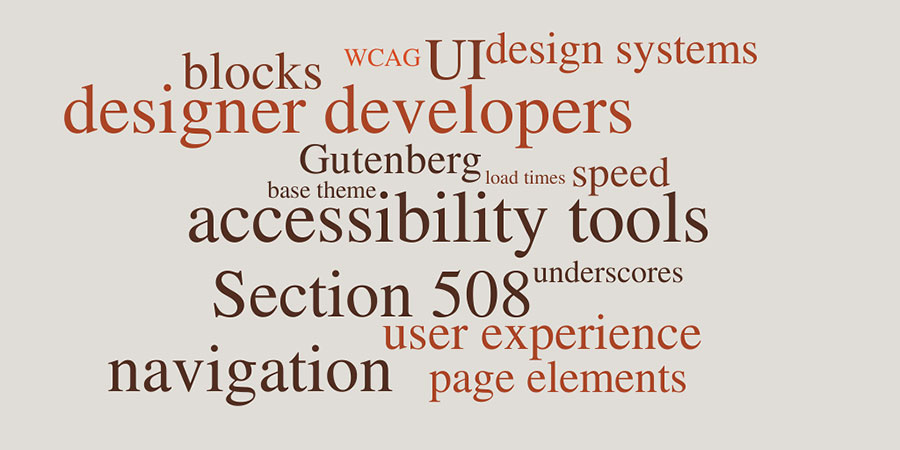
The third of WordCamp Philly 2019’s tracks is the Arch Street Track, which will be in the Tuttleman Gallery on the second floor of The Pennsylvania Academy of the Fine Arts. It will feature design, theming, user experience, site performance and more.
The track is named for another of the streets that was part of William Penn’s city plan dating to the 1680s. Known as Mulberry Street at first, it was renamed Arch in 1854. The Betsy Ross House, U.S. Mint, Independence Mall and Chinatown are all found along Arch Street.
The sessions and speakers for the Arch Street track are:
Beyond Pretty: Taking Design Beyond the Basics to Create Richer User Experiences
The blog is growing up, and how we use WordPress is, too. As we move into an ecosystem driven by blocks, user-centered design will play an increasingly important role. Whether you manage a site, build sites or apps for clients, or develop for any part of WordPress, there are several user experience principles that you need to know in order to deliver the best product possible. Learn how to take your WordPress solutions beyond the blog by putting UX and UI front and center to create successful user experiences for your WordPress navigation, login, onboarding, form, and e-commerce components.
Getting Gutenberg to Do What You Need It to Do
No need to feel stuck using the 40 blocks that come with the new page editor out of the box. Gutenberg plugins — a new type of WordPress plugin — gives you an opportunity to use all types of new blocks for your content. These blocks let you add new UIs to your content such as adjustable columns, pricing tables, a table of contents, a clock countdown and many others. See how five Gutenberg plugins will make creating WordPress easier and a lot of fun.
Development Is Design
Learn how WordPress, and Gutenburg in particular, is changing the role of designers and opening up more opportunities than ever. The role of the designer has evolved dramatically in the last decade, and as designers continue to create more work for digital spaces, it becomes more important than ever to be able to understand computer languages and how the network works. This talk will cover how designers of all types can continue to grow their skills by applying the lessons in design thinking we can learn from code.
Design Systems in WordPress
Design systems are codified ways for organizations to bridge the gap between design and development. Creating a design system is a collaborative task that includes key professionals from each discipline. This talk will show you the power of design systems and how to use WordPress to host your design system.
Five Easy Performance Wins to Optimize Your WordPress Website
Do you know how fast your site loads? What about on 4G? 3G?! More than just solving an annoyance, reducing long load times is more critical now than ever before with speed officially a factor in both desktop and mobile search ranking. This talk will cover five steps you can take today to enhance the performance of your WordPress website.
What Does your Brand Look Like in a Voice-First World?
With the explosive adoption of smart speakers, the primary interaction with your content will become auditory instead of visual. On the World Wide Web, our brand revolves around a URL, logo, tagline, color palette, font, images, etc., but when your audience is no longer engaging with your content through a screen, traditional brand elements become invisible. In a voice-first environment, when your audience just asks for what they want, they expect the answer to be returned verbally.
In a voice-first world, what does your brand look (or sound) like? In this talk, Chip Edwards explores the components of a verbal brand and how to prepare for the shift from written content to verbal content, as well as the future of voice technology and how to prepare for it.
How I Rebuilt My Base Theme for Gutenberg
Beth Soderberg built her first base theme in 2016 using _s (also known as Underscores) and rebuilt the theme this year to be fully Gutenberg-compatible. The original theme used conventions she developed during several years working as a developer in agency settings. In rebuilding the theme she incorporated some significant non-Gutenberg-related changes and learned a lot about reasonable Gutenberg defaults. This talk will cover the changes to the base theme that Gutenberg required, the process she went through to rebuild, and the reasoning behind the architectural changes made to the theme that are not tied to Gutenberg. She’ll also talk about how she intends to iterate on this theme and add improvements over time. You might ask: but what is a base theme? A base theme, also known as a starter theme, is a bare-bones theme that includes default templates and very basic styling that is intended to be hacked and transformed into a fully custom theme. Using base/starter themes are often the next step in the learning process for a developer who has been modifying themes by using child themes. This talk is for anyone who wants to build (or rebuild) their own base theme for use in building custom WordPress themes.
Find Out More
Visit the Schedule page to see all the tracks and talks lined up for WordCamp Philly 20189. Then head over to the Tickets page to register for the event.

